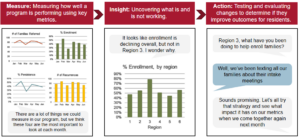Overview
Residents rely on government services every day, whether they are calling 911, finding affordable housing resources, or enrolling in public benefits programs. To improve these essential services and deliver better outcomes for residents, governments must determine how well services are currently performing and identify areas for improvement.
However, government leaders often lack insight into how a service is performing until it ends and vendors are paid. The GPL’s Data-Driven Performance Management approach helps government leaders assess how services are performing as they are being delivered, allowing for real-time improvements. It also helps leaders collaborate more effectively with service providers to improve the delivery of critical social services to residents.
The iterative approach consists of three core components:
- Measure: Measuring how well a program is performing using key metrics.
- Insight: Uncovering what is and is not working.
- Action: Testing and evaluating changes to determine if they improve outcomes for residents.

Explore the GPL’s other strategic capabilities:









